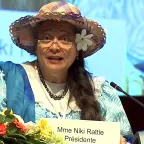Moot court: competitions on IHL
Moot court competitions on IHL eminently contribute to generate interest in IHL and humanitarian issues amongst students and teachers. Students find it interesting and entertaining while they …
Moot court competitions on IHL eminently contribute to generate interest in IHL and humanitarian issues amongst students and teachers. Students find it interesting and entertaining while they …

183 nationalities gathered in Geneva under the banner of "Our World, Your Move – For Humanity." This video looks at the 31st International Conference of the Red Cross and Red Crescent Movement and …

ADVISORY SERVICE ON INTERNATIONAL HUMANITARIAN LAW ____________________________________ Development of national legislation to implement the Convention on the prohibition of anti-personnel mines - …
Alberto Cairo runs the ICRC's orthopaedic programme in Afghanistan . At the end of November 2011, the International Red Cross and Red Crescent Movement hosted its first-ever TEDx event, called …
International humanitarian law bans or restricts certain types of conventional weapons in order to protect civilians from their indiscriminate effects and to spare combatants from excessive injuries …
International humanitarian law contains basic principles and rules governing the choice of weapons and prohibits or restricts the employment of certain weapons. The ICRC plays a leading role in the …
Each year large numbers of civilians are killed and injured by "explosive remnants of war". These are the unexploded weapons such as artillery shells, mortars, grenades, bombs and rockets, left …
Parties to an armed conflict are limited in their choice of weapons, and in the means and methods of warfare they use, by the rules of international Parties to an armed conflict are limited in their …
Cluster munitions have had a severe impact on civilians, killing and injuring large numbers and causing long lasting socio-economic problems. In 2008, governments negotiated and adopted the …
Try one of the following resources:
Created in 1863, the ICRC library, alongside the ICRC archives, provides an indispensable documentary reference on the organization itself and international humanitarian law.
International humanitarian law is based on a number of treaties, in particular the Geneva Conventions of 1949 and their Additional Protocols, and a series of other instruments.
Customary international humanitarian law consists of rules that come from "a general practice accepted as law" and that exist independent of treaty law.